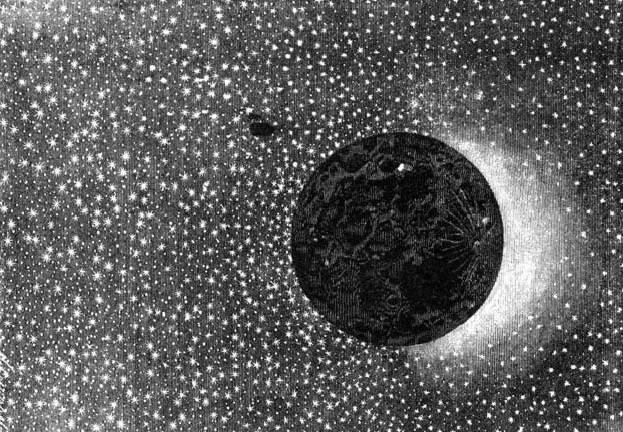Solar eclipses are spectacular.
There was recently a partial solar eclipse. Miraculously, the perpetually cloudy Vancouver skies cleared at just the moment of the eclipse’s maximum expression.
I raced out onto the office patio, shielding my eyes and squinting up at the sun (an enthusiastic, but slightly dumbass move, since you’re not supposed to look at the sun with your naked eyes). And, although the sun’s light still shone brightly, a piece of it was missing.
A strange dark leviathan had moved across its face, making the sun less than perfectly round. And in that moment, the edges of the sun—and its brightness—were visible.
A solar eclipse is special because the moon is moving across the face of the sun at just the right angle to partially obscure its sunlight from the earth. In a full solar eclipse, the moon completely covers the sun’s face, so that its rays create a spectacular halo around the dark edges of the moon. Through being obscured, we can see the sun’s true luminosity shining from behind.
Although we continually feel the effects of the sun, we usually don’t really see it. It’s simply too bright; it lives in the world “up there” and is only visible to us when it descends deeply enough toward the horizon to be obscured by our planet’s atmosphere—or when there is a solar eclipse.
The sun’s own brightness masks it from perception.
We experience similar galactic movements in ourselves.
The brightness of our highest essence is always present, visible in the effect we have as we express ourselves in the world. However, this light is so ubiquitous to our “us-ness” that we don’t directly perceive its power.
Similar to the sun on a cloudless day, our highest nature is strangely invisible; we are hidden by our own brightness.
When our lives are joyful, we take the light for granted, and we do not see ourselves.
I remember sitting with my ex-husband on the battlefield of our marriage, the day that I told him we weren’t ever getting back together. We were both emotionally exhausted. depleted, depressed. Through our pain and fear, we had torn each other down, been blind to each other’s pain, and utterly depleted our resources.
Like collapsing binary stars, the gravitational force that had originally pulled us together was now destroying us. In my despair, I had turned to cutting myself to relieve the pain.
We may not always like what is revealed by the shadow.
The darkness that came into my life through my marriage revealed what had been hidden from view.
When life was happily rolling along, I did not see my broken edges, my unfinished business. Only when the shadow fell did these places become exposed. And only in the darkness was there an opportunity to witness, heal, and connect consciously to a greater source, a place of deep compassion and growth in the midst of vulnerability and pain.
When the darkness reveals who we are, can we sit in the vulnerability of our exposure? Can we dare to be so poignantly revealed? The darkness allows us to more fully experience our resiliency, grace, compassion and power.
We shine from behind. We become more sensitive to our sweetness, vulnerability, and humanity.
Through the shadow, we perceive our light.
With my ex-husband, I wanted to resist the revelation; to avoid the terrifying exposure of who I was and what I had created through my fear and pain. But only through this exposure could I heal my broken places.
In the darkest hour of my marriage, I discovered my ability to become accountable, speak my truth, and stand in my own light.
The darkness provides the very instruments through which we are able perceive and evolve our highest selves most fully. While we may not embrace the darkness for its own sake, we can open to its poignant offering to become more exposed, visible, connected and alive.
Through darkness, we become most fully, brilliantly and sweetly revealed.
Love elephant and want to go steady?
Sign up for our (curated) daily and weekly newsletters!
Author: Rachel Scott
Editor: Emily Bartran
Photo: Wikimedia Commons












Read 1 comment and reply